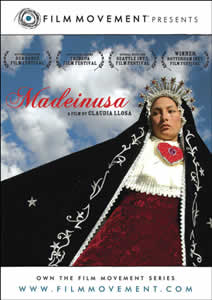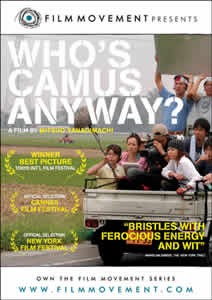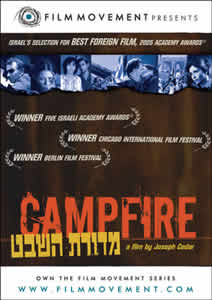 Stuart Litman joined Film Movement in 2003 as its Company CEO. Since his arrival, Film Movement has focused on new distribution channels including securing new relationships with television, video on demand, home video partners such as Amazon/Createspace, Netflix rental and electronic delivery, Blockbuster, and also Continental Airlines Inflight Entertainment.
Stuart Litman joined Film Movement in 2003 as its Company CEO. Since his arrival, Film Movement has focused on new distribution channels including securing new relationships with television, video on demand, home video partners such as Amazon/Createspace, Netflix rental and electronic delivery, Blockbuster, and also Continental Airlines Inflight Entertainment.
Meghan Wurtz is Vice President of Business Development at Film Movement. Ms. Wurtz Prior to joining Film Movement, she worked for European Film Promotion (EFP), an initiative aimed at raising industry awareness of European film and assisting in the further distribution and promotion of European films in North America, where she organized industry screenings in New York. Ms. Wurtz will maintain her position as the EFP contact in New York.
worked for European Film Promotion (EFP), an initiative aimed at raising industry awareness of European film and assisting in the further distribution and promotion of European films in North America, where she organized industry screenings in New York. Ms. Wurtz will maintain her position as the EFP contact in New York.
Prior to joining EFP, Meghan was with Northstar Media, where she was in charge of International Sales, selling concert films and documentaries to international broadcasters.
Previously, Ms. Wurtz worked with Peacefulfish, a unique media consulting company specializing in film financing and digital distribution that is based in Berlin, Germany.
 Cinema Without Borders: Can you please tell us about the background of Film Movement and the history of the company?
Cinema Without Borders: Can you please tell us about the background of Film Movement and the history of the company?
Meghan Wurtz: We started in 2002, in New York City. It was our goal to acquire all rights to our films, but at first we only exploited the theatrical, non-theatrical and home video rights. For home video, we released our films on DVD and they were exclusively available through our website. Eventually we evolved into a full service distribution company, exploiting additional rights such as television and making our DVDs available through other means, such as Blockbuster and Netflix.
Stuart Litman: The vision of the company was to try to expand the marketplace for these types of movies in the United States. Film Movement’s goal is to create a brand within this space, which we felt was really fragmented. We set out to acquire films that won awards at the major film festivals. We also created a curator board, comprised of individuals in the film festival world, who would help us select our films. So, in addition to doing theatrical, television, DVD and other home video deals, we created a DVD-of-the-Month club where people can subscribe and receive one of our DVDs every month, directly through us. They don’t have to sit through the thousands of films that are out there, and they get an opportunity to see a film through a curated process. We thought that was the crux of the idea and that we could use the rest of the distribution platforms to grow that on a monthly, and then yearly, basis.
CWB: What are the major movies, internationally, that Film Movement has released in the past two years?
Meghan: “Something Like Happiness”, which is a Czech film directed by Bohdan Sláma, that won awards in the Czech Republic and other film festivals. We also picked up a wonderful film called “Madeinusa”. It is a film from Peru that we saw at the Sundance Film Festival. The screenwriter/director Claudia Llosa won the Screenwriter’s Award at Sundance, and it was also Peru’s Foreign Language Oscar submission for last year. It is a beautiful, colorful film, and we released it in April on DVD. It is a film that a lot of people didn’t hear about, and it is a perfect example of our whole process of finding films that get a little bit of buzz around the festival circuit.
 Stuart: “Adam’s Apples” is another film that we picked up and was the Danish Oscar submission for the Foreign Language category. Other films include “Ali Zaoua”, from Morocco, “Antares”, from Austria, and “Be With Me”, from Singapore, which was chosen as an Oscar submission. Many films, such as “Hawaii, Oslo”, “Campfire”, “The Way I Spent the End of the World”—a film that we recently acquired — also were submitted for Oscar consideration. We also have a film from Cuba, called “Viva Cuba.” By-and-large, out of the 55 films or so that we have released —and probably two-thirds have been Foreign Language — I would say that half of them were their country’s submission for the Oscars that year.
Stuart: “Adam’s Apples” is another film that we picked up and was the Danish Oscar submission for the Foreign Language category. Other films include “Ali Zaoua”, from Morocco, “Antares”, from Austria, and “Be With Me”, from Singapore, which was chosen as an Oscar submission. Many films, such as “Hawaii, Oslo”, “Campfire”, “The Way I Spent the End of the World”—a film that we recently acquired — also were submitted for Oscar consideration. We also have a film from Cuba, called “Viva Cuba.” By-and-large, out of the 55 films or so that we have released —and probably two-thirds have been Foreign Language — I would say that half of them were their country’s submission for the Oscars that year.
CWB: Some distributors claim that there isn’t a market for some of these films or that the market is too limited. What has your experience been regarding the market?
Stuart: Unfortunately, the market is limited by the retailers, studios, and theaters—I don’t think that it’s the consumers limiting the market. I think the American population, when exposed to these types of movies, generally really like them. If you look at “Pan’s Labyrinth”, “Life is Beautiful”, “Amelie”, “Passion of the Christ” or “Apocalypto”, these were all foreign language films that were pushed by the studios. The consumers came out and saw them in the theaters, and then it trickles down to the other venues. Unfortunately, Hollywood is run by seven studios and they have their own machines that they need to keep up, and to hedge. The way Hollywood works is that it is a hedging formula. If you are the Studio and you are making a film, you have various distribution channels that you are locked into for every film, in order to offset your financial risk. So you don’t have room to take chances, and bring your audience things they may otherwise be entertained by. You have to continually bringing them things they want. You have to keep bringing them Coke if they want Coke; you can’t really bring them Iced Tea. What happens is that other companies, like ours, continue to build awareness of non-mainstream films, and the studios come in and pick a “Pan’s Labyrinth.” They bring it through the shadows and remind the consumers that these kinds of films are out there for them.
CWB: How do you select the films for distribution? Is there any way for a filmmaker with a good film to find you and see if you are interested in distributing their film?
Meghan: The first question our team asks whenever we get contacted by filmmakers is if it has been accepted to any of the major film festivals: Toronto, New York, Berlin, Sundance, Cannes, Venice or Tribeca. We also only acquire finished films; that is, we do not do any film production or post production.
Stuart: What the American consumers also don’t understand is that most of these European and Asian made films all get tax credits from their government. These are not small budget films. They have the same quality of actors and directors that are seen in our $100 million blockbusters, so to speak. When the consumer is exposed to this, and they see the beautiful cinematography, dialogue and storytelling, many get excited to see that these films are out there, so we increase our customer base year-in and year-out. Most people don’t know this, but the Sundance Film Festival has over half of the films in its World Cinema category, and all of them screen to sold-out theaters, just like the American indies. It just shows that there is interest in this country for good storytelling, good filmmaking, regardless of the film’s language.
CWB: The number of film festivals with International Films in the United States has been growing the past few years. We now have around 1000 film festivals in the US showing International Movies. Does that help Film Movement in finding new customers and people who want to buy DVDs and see movies that you distribute?
Stuart: Yes, the more foreign films people are exposed to, the more customers search out other foreign films, building awareness. We actually look to expand upon that number of film festivals with every chance we get. We provide a lot of films to festivals to continue the exposure of the films and the exposure of the art. We are very encouraged by the film festival genre in general, and this is where the celebrities  help because they bring attention to the film festivals and people actually understand that film festivals can be like Hollywood films, by-and-large. So, to answer your question—yes, it helps a lot.
help because they bring attention to the film festivals and people actually understand that film festivals can be like Hollywood films, by-and-large. So, to answer your question—yes, it helps a lot.
CWB: Also, what are some movies that we should expect to see from Film Movement in the coming months?
Meghan: “The Violin.” It’s a Mexican film. It has won awards at the Cannes, San Francisco and Miami Film Festivals. We picked it up at the Toronto Film Festival in 2006. You will definitely hear about it because it’s hitting theaters December 5th. We will be opening it at the Film Forum in New York City.
CWB: What are some new DVD releases that will be coming from Film Movement?
Meghan: “Familia” came out on June 26th. That’s a French language film that was shot in Quebec. Also released on June 26th was “A Peck on the Cheek”, which was shot in India. It’s not a Bollywood film; it’s more of a drama. In addition, we just recently released two films in August “Mother of Mine”, a Swedish-Finnish film, and “Roads to Koktebel”, a Russian film.
CWB: What are the plans for the future of the Film Movement and are there any expansions that you have in mind?
Stuart: Our hope is to secure additional distribution deals for the content that we presently buy, so that we can triple-to-quadruple the amount films that we buy on a yearly basis. Right now, we are buying twelve; we hope to get to 36-40 in the next 12-18 months, on an annualized basis. Not all of these will go theatrical, but we definitely want to increase the amount of theatrical releases, too.

